Unit 10 If you go to the party, you'll have a great time! Section B 重要知识考点+练习过关(含答案)
文档属性
| 名称 | Unit 10 If you go to the party, you'll have a great time! Section B 重要知识考点+练习过关(含答案) | 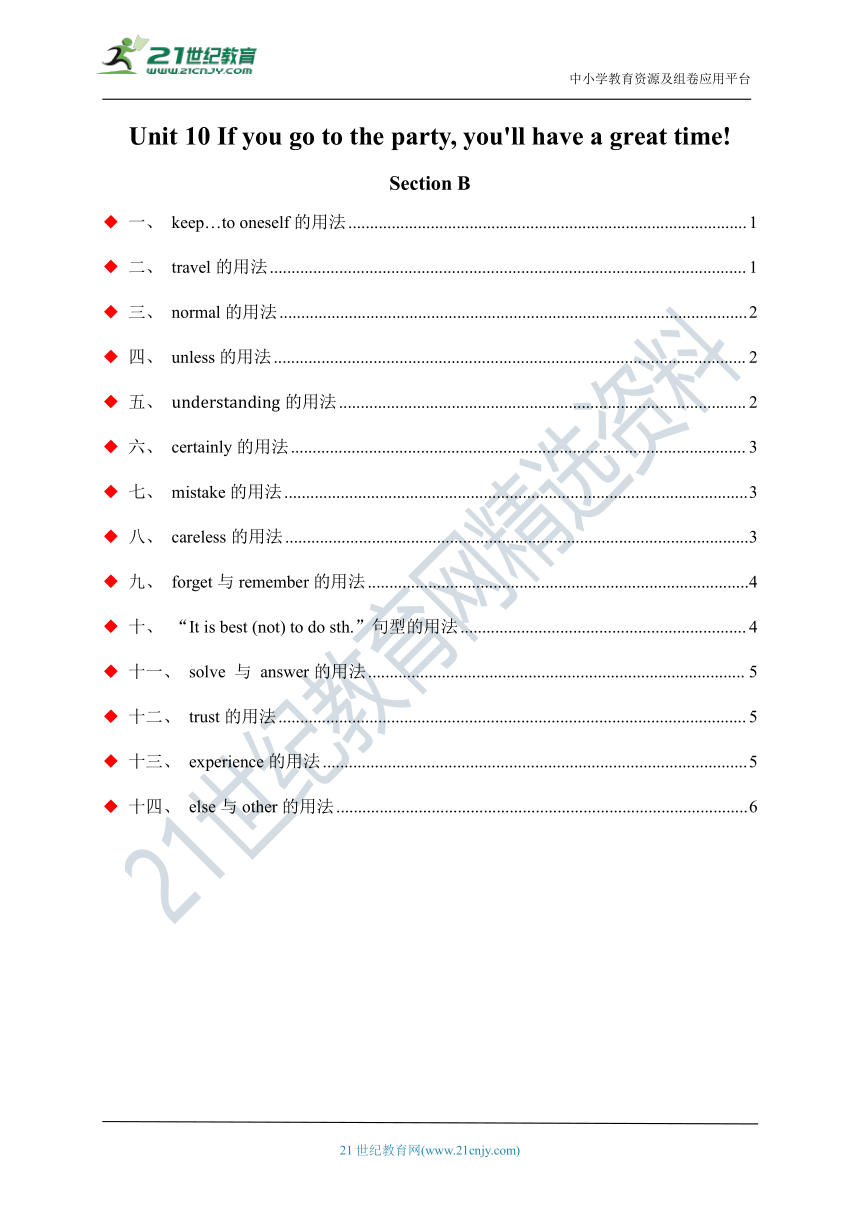 | |
| 格式 | docx | ||
| 文件大小 | 1011.1KB | ||
| 资源类型 | 试卷 | ||
| 版本资源 | 人教新目标(Go for it)版 | ||
| 科目 | 英语 | ||
| 更新时间 | 2021-09-29 16:29:47 | ||
图片预览

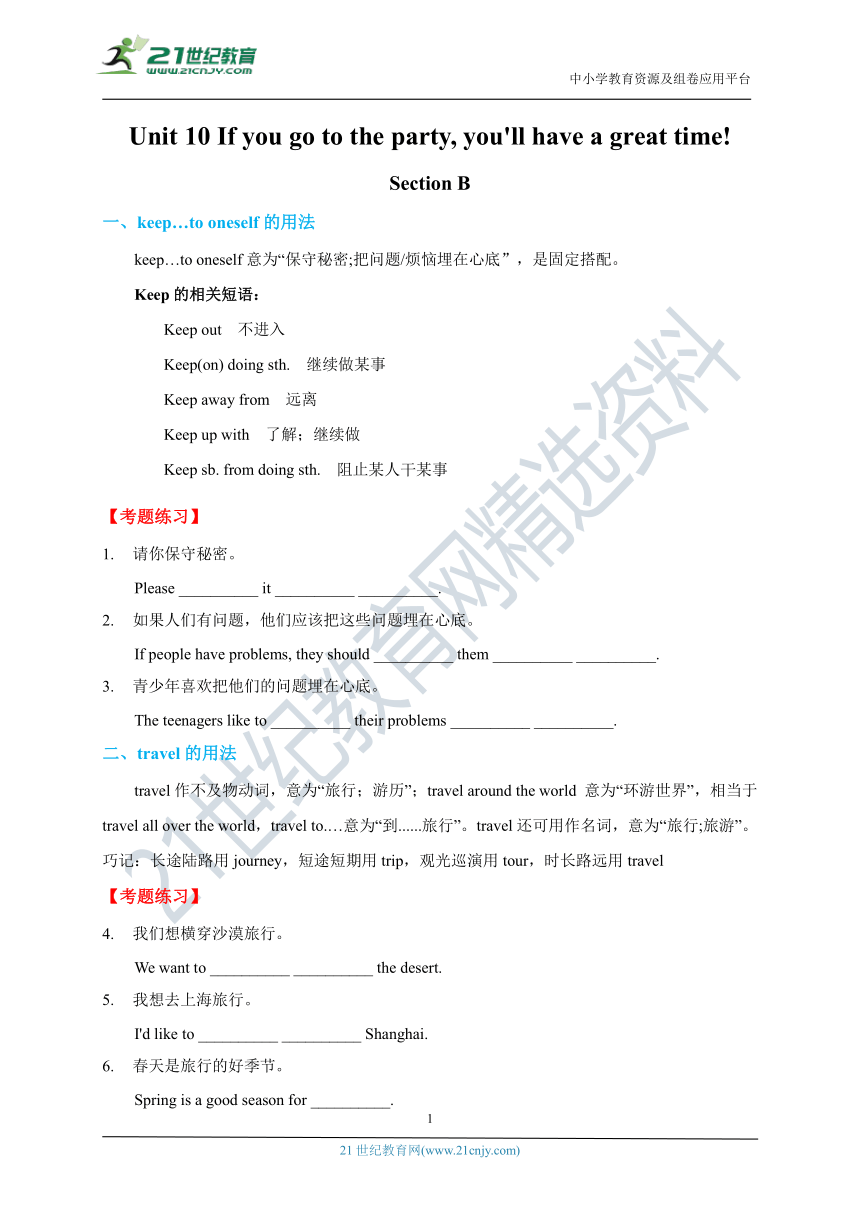
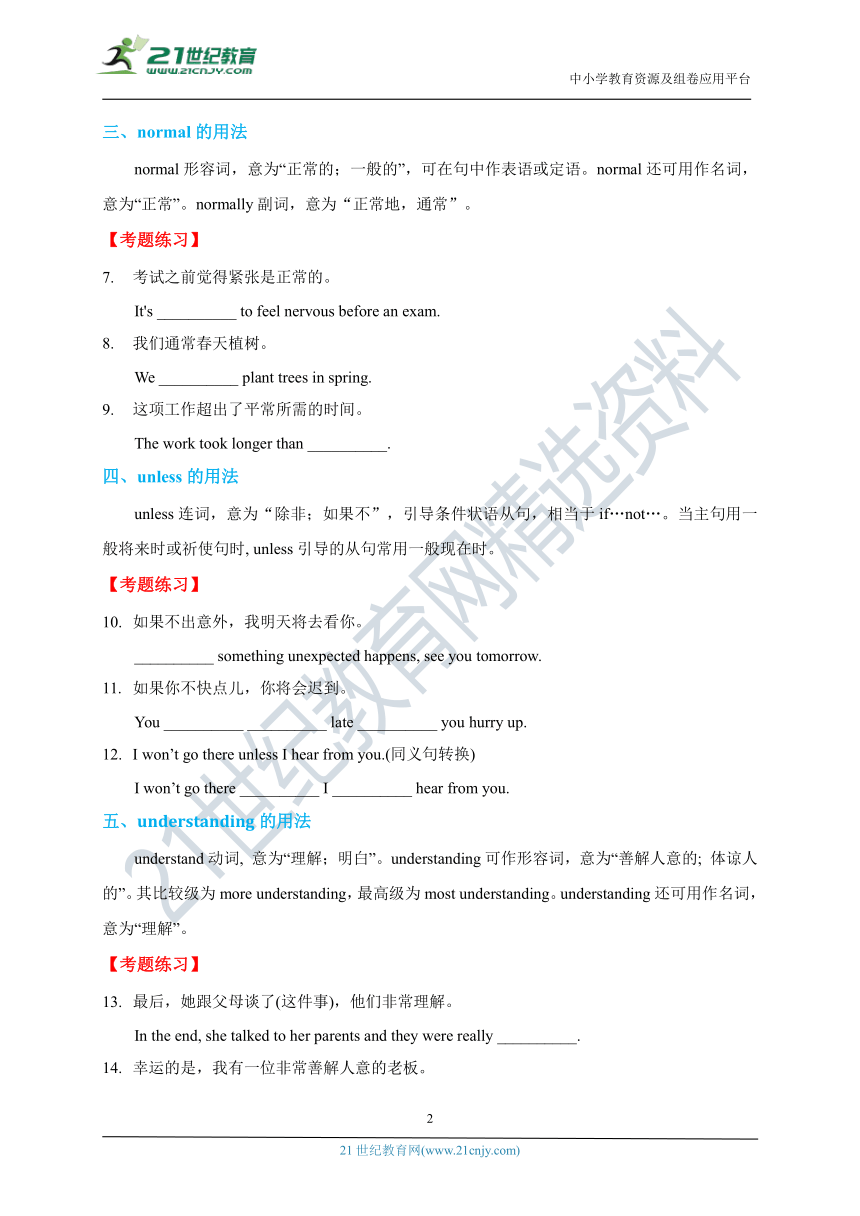
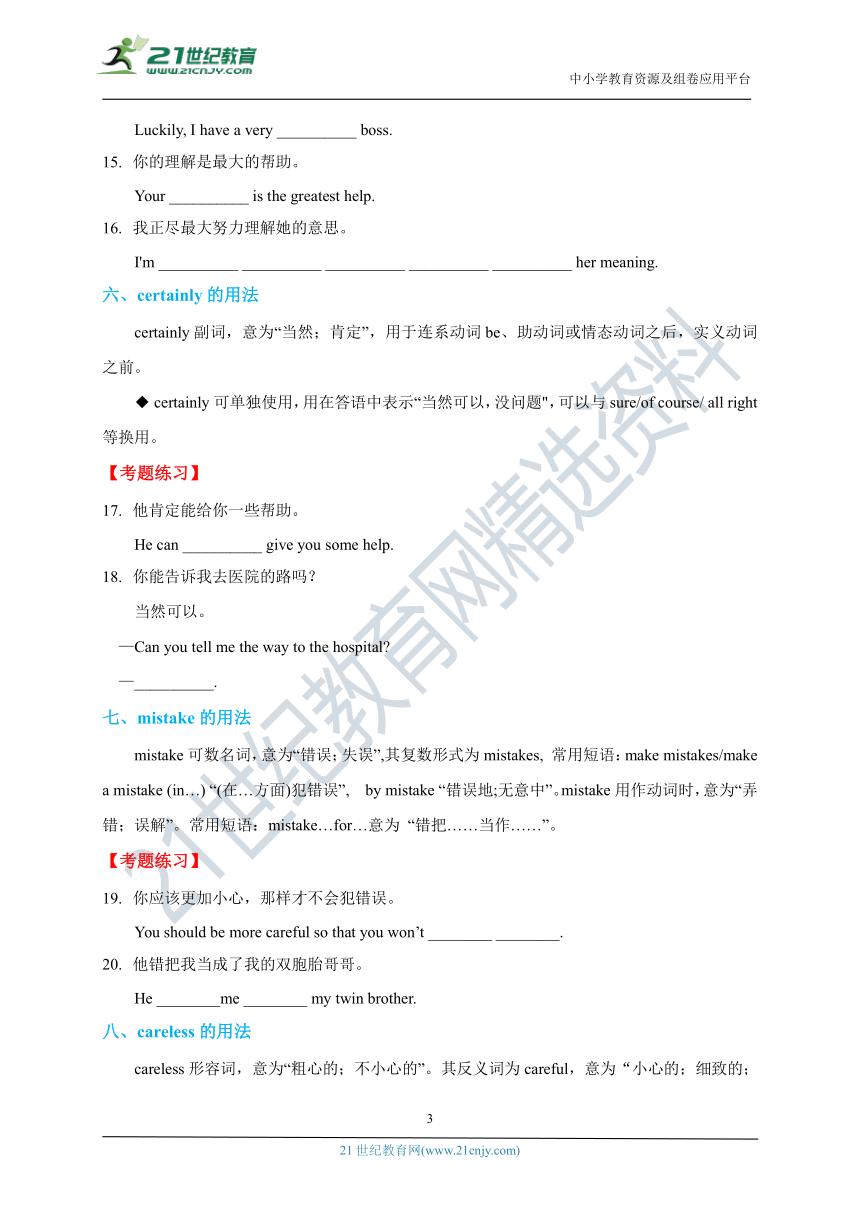
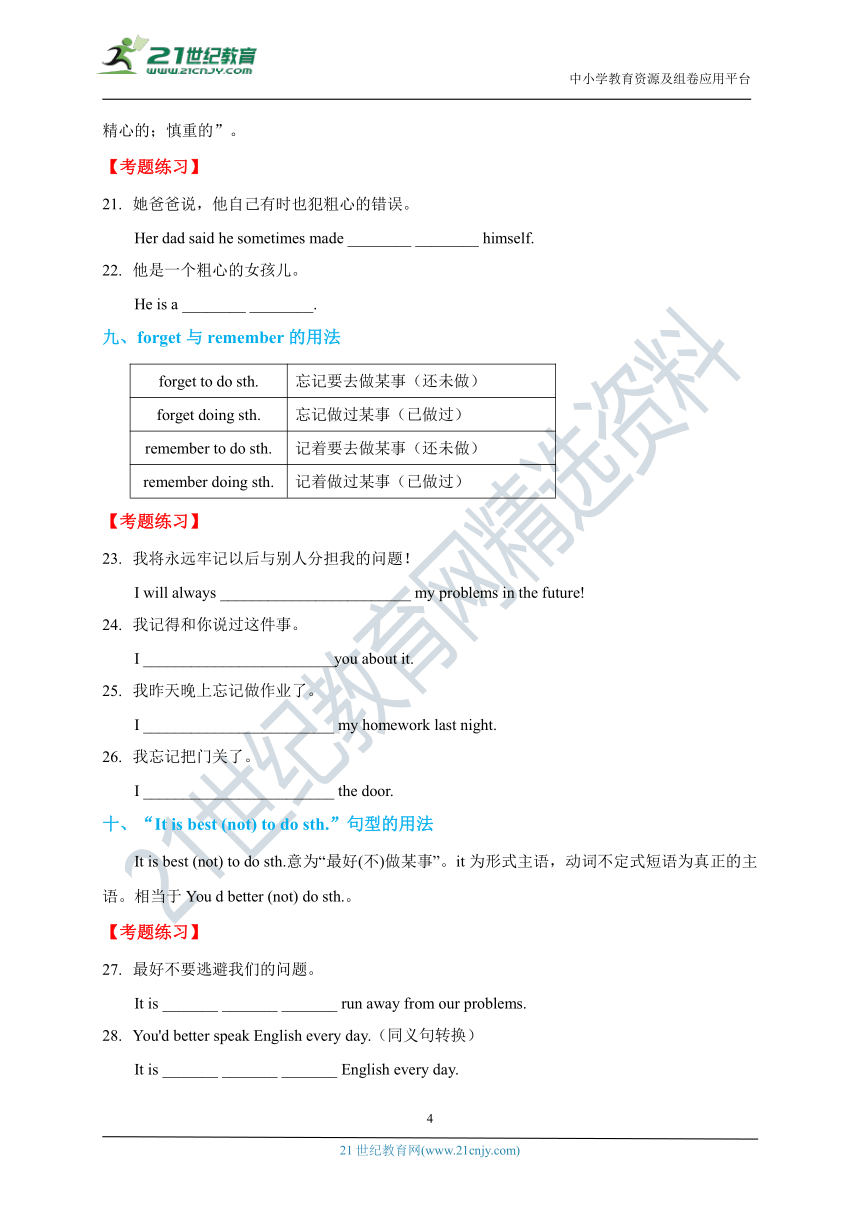
文档简介
Unit
10
If
you
go
to
the
party,
you'll
have
a
great
time!
Section
B
一、
keep…to
oneself的用法
1
二、
travel的用法
1
三、
normal的用法
2
四、
unless的用法
2
五、
understanding的用法
2
六、
certainly的用法
3
七、
mistake的用法
3
八、
careless的用法
3
九、
forget与remember的用法
4
十、
“It
is
best
(not)
to
do
sth.”句型的用法
4
十一、
solve
与
answer的用法
5
十二、
trust的用法
5
十三、
experience的用法
5
十四、
else与other的用法
6
中小学教育资源及组卷应用平台
21世纪教育网
www.21cnjy.com
精品试卷·第
2
页
(共
2
页)
21世纪教育网(www.21cnjy.com)
Unit
10
If
you
go
to
the
party,
you'll
have
a
great
time!
Section
B
keep…to
oneself的用法
keep…to
oneself意为“保守秘密;把问题/烦恼埋在心底”,是固定搭配。
Keep的相关短语:
Keep
out
不进入
Keep(on)
doing
sth.
继续做某事
Keep
away
from
远离
Keep
up
with
了解;继续做
Keep
sb.
from
doing
sth.
阻止某人干某事
【考题练习】
请你保守秘密。
Please
__________
it
__________
__________.
如果人们有问题,他们应该把这些问题埋在心底。
If
people
have
problems,
they
should
__________
them
__________
__________.
青少年喜欢把他们的问题埋在心底。
The
teenagers
like
to
__________
their
problems
__________
__________.
travel的用法
travel作不及物动词,意为“旅行;游历”;travel
around
the
world
意为“环游世界”,相当于
travel
all
over
the
world,travel
to.…意为“到......旅行”。travel还可用作名词,意为“旅行;旅游”。
巧记:长途陆路用journey,短途短期用trip,观光巡演用tour,时长路远用travel
【考题练习】
我们想横穿沙漠旅行。
We
want
to
__________
__________
the
desert.
我想去上海旅行。
I'd
like
to
__________
__________
Shanghai.
春天是旅行的好季节。
Spring
is
a
good
season
for
__________.
normal的用法
normal形容词,意为“正常的;一般的”,可在句中作表语或定语。normal还可用作名词,意为“正常”。normally副词,意为“正常地,通常”。
【考题练习】
考试之前觉得紧张是正常的。
It's
__________
to
feel
nervous
before
an
exam.
我们通常春天植树。
We
__________
plant
trees
in
spring.
这项工作超出了平常所需的时间。
The
work
took
longer
than
__________.
unless的用法
unless连词,意为“除非;如果不”,引导条件状语从句,相当于if…not…。当主句用一般将来时或祈使句时,
unless引导的从句常用一般现在时。
【考题练习】
如果不出意外,我明天将去看你。
__________
something
unexpected
happens,
see
you
tomorrow.
如果你不快点儿,你将会迟到。
You
__________
__________
late
__________
you
hurry
up.
I
won’t
go
there
unless
I
hear
from
you.(同义句转换)
I
won’t
go
there
__________
I
__________
hear
from
you.
understanding的用法
understand动词,
意为“理解;明白”。understanding可作形容词,意为“善解人意的;
体谅人的”。其比较级为more
understanding,最高级为most
understanding。understanding还可用作名词,意为“理解”。
【考题练习】
最后,她跟父母谈了(这件事),他们非常理解。
In
the
end,
she
talked
to
her
parents
and
they
were
really
__________.
幸运的是,我有一位非常善解人意的老板。
Luckily,
I
have
a
very
__________
boss.
你的理解是最大的帮助。
Your
__________
is
the
greatest
help.
我正尽最大努力理解她的意思。
I'm
__________
__________
__________
__________
__________
her
meaning.
certainly的用法
certainly副词,意为“当然;肯定”,用于连系动词be、助动词或情态动词之后,实义动词之前。
◆
certainly可单独使用,用在答语中表示“当然可以,没问题",可以与sure/of
course/
all
right
等换用。
【考题练习】
他肯定能给你一些帮助。
He
can
__________
give
you
some
help.
你能告诉我去医院的路吗?
当然可以。
—Can
you
tell
me
the
way
to
the
hospital
—__________.
mistake的用法
mistake可数名词,意为“错误;失误”,其复数形式为mistakes,
常用短语:make
mistakes/make
a
mistake
(in…)
“(在…方面)犯错误”,
by
mistake
“错误地;无意中”。mistake用作动词时,意为“弄错;误解”。常用短语:mistake…for…意为
“错把……当作……”。
【考题练习】
你应该更加小心,那样才不会犯错误。
You
should
be
more
careful
so
that
you
won’t
________
________.
他错把我当成了我的双胞胎哥哥。
He
________me
________
my
twin
brother.
careless的用法
careless形容词,意为“粗心的;不小心的”。其反义词为careful,意为“小心的;细致的;精心的;慎重的”。
【考题练习】
她爸爸说,他自己有时也犯粗心的错误。
Her
dad
said
he
sometimes
made
________
________
himself.
他是一个粗心的女孩儿。
He
is
a
________
________.
forget与remember的用法
forget
to
do
sth.
忘记要去做某事(还未做)
forget
doing
sth.
忘记做过某事(已做过)
remember
to
do
sth.
记着要去做某事(还未做)
remember
doing
sth.
记着做过某事(已做过)
【考题练习】
我将永远牢记以后与别人分担我的问题!
I
will
always
________________________
my
problems
in
the
future!
我记得和你说过这件事。
I
________________________you
about
it.
我昨天晚上忘记做作业了。
I
________________________
my
homework
last
night.
我忘记把门关了。
I
________________________
the
door.
“It
is
best
(not)
to
do
sth.”句型的用法
It
is
best
(not)
to
do
sth.意为“最好(不)做某事”。it为形式主语,动词不定式短语为真正的主语。相当于You
d
better
(not)
do
sth.。
【考题练习】
最好不要逃避我们的问题。
It
is
_______
_______
_______
run
away
from
our
problems.
You'd
better
speak
English
every
day.(同义句转换)
It
is
_______
_______
_______
English
every
day.
solve
与
answer的用法
solve
“解决;解答”
常与problem搭配使用,表示解决问题,此问题难度较大
answer
“回答;回复”,常与question搭配使用,表示回答问题,此问题难度较小
【考题练习】
你能帮我解决这个问题吗?
Can
you
help
me
_______
the
problem
谁能回答我的问题?
Who
can
_______
my
question
trust的用法
trust用作动词,意为“信任;相信”。常见用法有:
trust
sb.
信任某人
trust
sb.
(not)
to
do
sth.
相信某人(不)会做
某事
trust
sth.
相信某事
【考题练习】
我就是不信任那个人。
I
just
don't
_______
that
man.
你可以相信我不会跟任何人讲。
You
can
_______
me
_______
_______
_______
anyone.
我相信她的判断力。
I
_______
her
judgement
experience的用法
experience用作不可数名词,意为“经验”。experience还可用作可数名词,意为“经历”。
【考题练习】
学生们经常忘记他们的父母拥有更多的经验
Students
often
forget
that
their
parents
have
more
______________.
我们的英语老师有丰富的教学经验。
Our
English
teacher
has
a
lot
of
teaching
______________.
汤姆喜欢旅游,他有许多不寻常的经历。
Tom
likes
traveling.
He
has
many
unusual
______________.
else与other的用法
else
副词,意为“别的;其他的”。修饰疑问词或不定代词,置于这些词之后
other
形容词,意为“其余的;另外的”
修饰名词,且位于名词之前
【考题练习】
在图片中你还能看到什么?
What
_______
can
you
see
in
the
picture
还有其他人参加聚会吗?
Is
anyone
_______
going
to
the
party
你在房间里还能看见别的什么东西?
What
_______
things
can
you
see
in
the
room.
参
考
答
案
keep;to
yourself
keep;to
themselves
keep;to
themselves
travel
across
travel
to
travel
normal
normally/usually
normal
Unless
will
be;unless
if;don't
understanding
understanding
understanding
trying
my
best
to
understand
certainly
certainly/sure
make
mistakes
mistakes;for
careless
mistakes
careless
girl
remember
to
share
remember
telling
forget
to
do
forget
closing
best
not
to
best
to
speak
solve
answer
trust
trust;not
to
tell
trust
experience
experience
experiences
else
else
other
21世纪教育网(www.21cnjy.com)
10
If
you
go
to
the
party,
you'll
have
a
great
time!
Section
B
一、
keep…to
oneself的用法
1
二、
travel的用法
1
三、
normal的用法
2
四、
unless的用法
2
五、
understanding的用法
2
六、
certainly的用法
3
七、
mistake的用法
3
八、
careless的用法
3
九、
forget与remember的用法
4
十、
“It
is
best
(not)
to
do
sth.”句型的用法
4
十一、
solve
与
answer的用法
5
十二、
trust的用法
5
十三、
experience的用法
5
十四、
else与other的用法
6
中小学教育资源及组卷应用平台
21世纪教育网
www.21cnjy.com
精品试卷·第
2
页
(共
2
页)
21世纪教育网(www.21cnjy.com)
Unit
10
If
you
go
to
the
party,
you'll
have
a
great
time!
Section
B
keep…to
oneself的用法
keep…to
oneself意为“保守秘密;把问题/烦恼埋在心底”,是固定搭配。
Keep的相关短语:
Keep
out
不进入
Keep(on)
doing
sth.
继续做某事
Keep
away
from
远离
Keep
up
with
了解;继续做
Keep
sb.
from
doing
sth.
阻止某人干某事
【考题练习】
请你保守秘密。
Please
__________
it
__________
__________.
如果人们有问题,他们应该把这些问题埋在心底。
If
people
have
problems,
they
should
__________
them
__________
__________.
青少年喜欢把他们的问题埋在心底。
The
teenagers
like
to
__________
their
problems
__________
__________.
travel的用法
travel作不及物动词,意为“旅行;游历”;travel
around
the
world
意为“环游世界”,相当于
travel
all
over
the
world,travel
to.…意为“到......旅行”。travel还可用作名词,意为“旅行;旅游”。
巧记:长途陆路用journey,短途短期用trip,观光巡演用tour,时长路远用travel
【考题练习】
我们想横穿沙漠旅行。
We
want
to
__________
__________
the
desert.
我想去上海旅行。
I'd
like
to
__________
__________
Shanghai.
春天是旅行的好季节。
Spring
is
a
good
season
for
__________.
normal的用法
normal形容词,意为“正常的;一般的”,可在句中作表语或定语。normal还可用作名词,意为“正常”。normally副词,意为“正常地,通常”。
【考题练习】
考试之前觉得紧张是正常的。
It's
__________
to
feel
nervous
before
an
exam.
我们通常春天植树。
We
__________
plant
trees
in
spring.
这项工作超出了平常所需的时间。
The
work
took
longer
than
__________.
unless的用法
unless连词,意为“除非;如果不”,引导条件状语从句,相当于if…not…。当主句用一般将来时或祈使句时,
unless引导的从句常用一般现在时。
【考题练习】
如果不出意外,我明天将去看你。
__________
something
unexpected
happens,
see
you
tomorrow.
如果你不快点儿,你将会迟到。
You
__________
__________
late
__________
you
hurry
up.
I
won’t
go
there
unless
I
hear
from
you.(同义句转换)
I
won’t
go
there
__________
I
__________
hear
from
you.
understanding的用法
understand动词,
意为“理解;明白”。understanding可作形容词,意为“善解人意的;
体谅人的”。其比较级为more
understanding,最高级为most
understanding。understanding还可用作名词,意为“理解”。
【考题练习】
最后,她跟父母谈了(这件事),他们非常理解。
In
the
end,
she
talked
to
her
parents
and
they
were
really
__________.
幸运的是,我有一位非常善解人意的老板。
Luckily,
I
have
a
very
__________
boss.
你的理解是最大的帮助。
Your
__________
is
the
greatest
help.
我正尽最大努力理解她的意思。
I'm
__________
__________
__________
__________
__________
her
meaning.
certainly的用法
certainly副词,意为“当然;肯定”,用于连系动词be、助动词或情态动词之后,实义动词之前。
◆
certainly可单独使用,用在答语中表示“当然可以,没问题",可以与sure/of
course/
all
right
等换用。
【考题练习】
他肯定能给你一些帮助。
He
can
__________
give
you
some
help.
你能告诉我去医院的路吗?
当然可以。
—Can
you
tell
me
the
way
to
the
hospital
—__________.
mistake的用法
mistake可数名词,意为“错误;失误”,其复数形式为mistakes,
常用短语:make
mistakes/make
a
mistake
(in…)
“(在…方面)犯错误”,
by
mistake
“错误地;无意中”。mistake用作动词时,意为“弄错;误解”。常用短语:mistake…for…意为
“错把……当作……”。
【考题练习】
你应该更加小心,那样才不会犯错误。
You
should
be
more
careful
so
that
you
won’t
________
________.
他错把我当成了我的双胞胎哥哥。
He
________me
________
my
twin
brother.
careless的用法
careless形容词,意为“粗心的;不小心的”。其反义词为careful,意为“小心的;细致的;精心的;慎重的”。
【考题练习】
她爸爸说,他自己有时也犯粗心的错误。
Her
dad
said
he
sometimes
made
________
________
himself.
他是一个粗心的女孩儿。
He
is
a
________
________.
forget与remember的用法
forget
to
do
sth.
忘记要去做某事(还未做)
forget
doing
sth.
忘记做过某事(已做过)
remember
to
do
sth.
记着要去做某事(还未做)
remember
doing
sth.
记着做过某事(已做过)
【考题练习】
我将永远牢记以后与别人分担我的问题!
I
will
always
________________________
my
problems
in
the
future!
我记得和你说过这件事。
I
________________________you
about
it.
我昨天晚上忘记做作业了。
I
________________________
my
homework
last
night.
我忘记把门关了。
I
________________________
the
door.
“It
is
best
(not)
to
do
sth.”句型的用法
It
is
best
(not)
to
do
sth.意为“最好(不)做某事”。it为形式主语,动词不定式短语为真正的主语。相当于You
d
better
(not)
do
sth.。
【考题练习】
最好不要逃避我们的问题。
It
is
_______
_______
_______
run
away
from
our
problems.
You'd
better
speak
English
every
day.(同义句转换)
It
is
_______
_______
_______
English
every
day.
solve
与
answer的用法
solve
“解决;解答”
常与problem搭配使用,表示解决问题,此问题难度较大
answer
“回答;回复”,常与question搭配使用,表示回答问题,此问题难度较小
【考题练习】
你能帮我解决这个问题吗?
Can
you
help
me
_______
the
problem
谁能回答我的问题?
Who
can
_______
my
question
trust的用法
trust用作动词,意为“信任;相信”。常见用法有:
trust
sb.
信任某人
trust
sb.
(not)
to
do
sth.
相信某人(不)会做
某事
trust
sth.
相信某事
【考题练习】
我就是不信任那个人。
I
just
don't
_______
that
man.
你可以相信我不会跟任何人讲。
You
can
_______
me
_______
_______
_______
anyone.
我相信她的判断力。
I
_______
her
judgement
experience的用法
experience用作不可数名词,意为“经验”。experience还可用作可数名词,意为“经历”。
【考题练习】
学生们经常忘记他们的父母拥有更多的经验
Students
often
forget
that
their
parents
have
more
______________.
我们的英语老师有丰富的教学经验。
Our
English
teacher
has
a
lot
of
teaching
______________.
汤姆喜欢旅游,他有许多不寻常的经历。
Tom
likes
traveling.
He
has
many
unusual
______________.
else与other的用法
else
副词,意为“别的;其他的”。修饰疑问词或不定代词,置于这些词之后
other
形容词,意为“其余的;另外的”
修饰名词,且位于名词之前
【考题练习】
在图片中你还能看到什么?
What
_______
can
you
see
in
the
picture
还有其他人参加聚会吗?
Is
anyone
_______
going
to
the
party
你在房间里还能看见别的什么东西?
What
_______
things
can
you
see
in
the
room.
参
考
答
案
keep;to
yourself
keep;to
themselves
keep;to
themselves
travel
across
travel
to
travel
normal
normally/usually
normal
Unless
will
be;unless
if;don't
understanding
understanding
understanding
trying
my
best
to
understand
certainly
certainly/sure
make
mistakes
mistakes;for
careless
mistakes
careless
girl
remember
to
share
remember
telling
forget
to
do
forget
closing
best
not
to
best
to
speak
solve
answer
trust
trust;not
to
tell
trust
experience
experience
experiences
else
else
other
21世纪教育网(www.21cnjy.com)
同课章节目录
- Unit 1 Where did you go on vacation?
- Section A
- Section B
- Unit 2 How often do you exercise?
- Section A
- Section B
- Unit 3 I'm more outgoing than my sister.
- Section A
- Section B
- Unit 4 What's the best movie theater?
- Section A
- Section B
- Unit 5 Do you want to watch a game show?
- Section A
- Section B
- Unit 6 I'm going to study computer science.
- Section A
- Section B
- Unit 7 Will people have robots?
- Section A
- Section B
- Unit 8 How do you make a banana milk shake?
- Section A
- Section B
- Unit 9 Can you come to my party?
- Section A
- Section B
- Unit 10 If you go to the party, you'll have a grea
- Section A
- Section B
